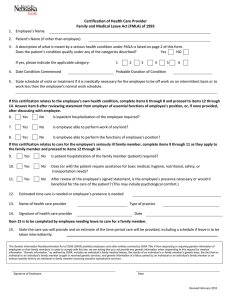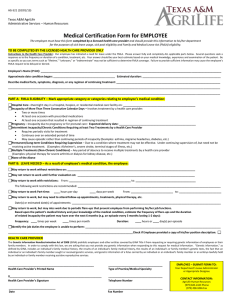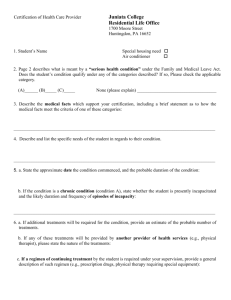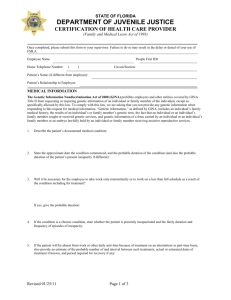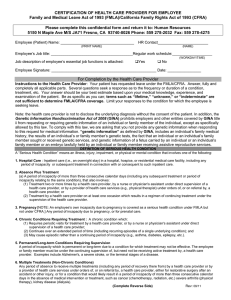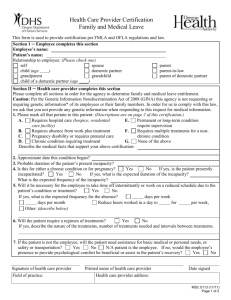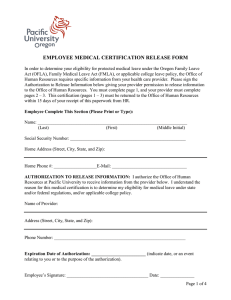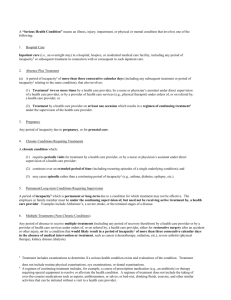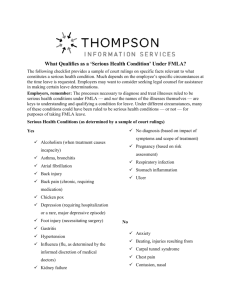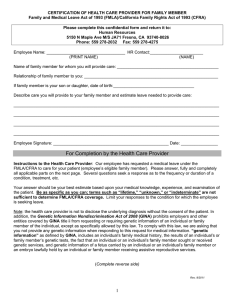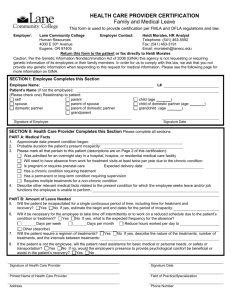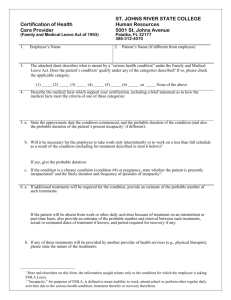Certifcation of Health Care Provider
advertisement
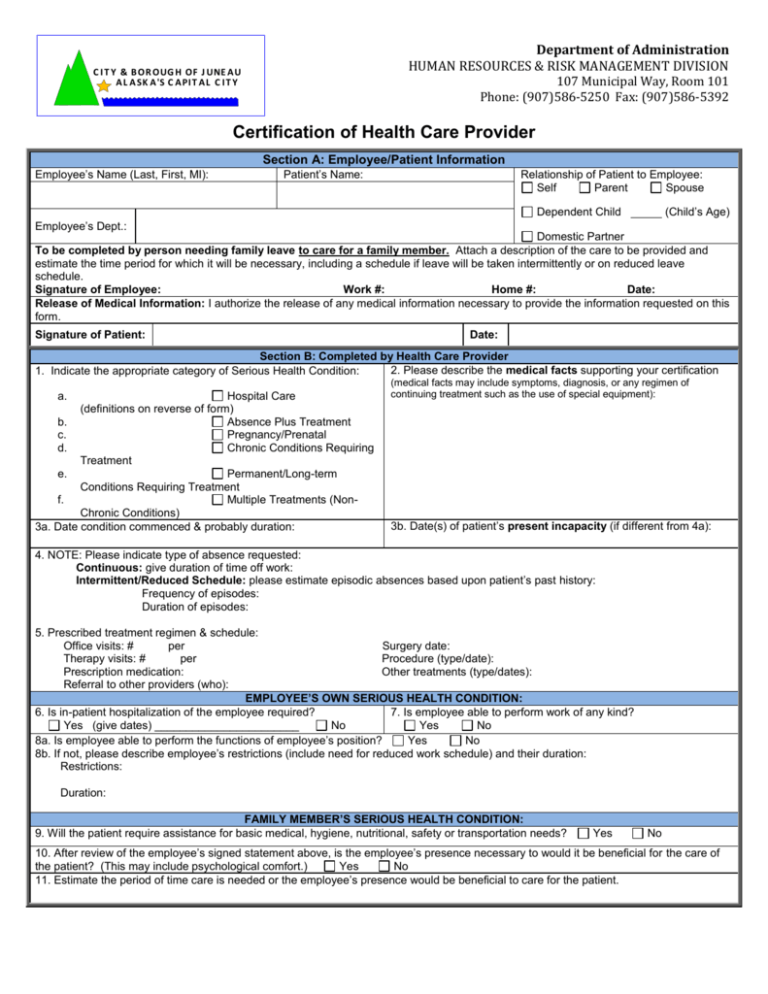
Department of Administration HUMAN RESOURCES & RISK MANAGEMENT DIVISION 107 Municipal Way, Room 101 Phone: (907)586-5250 Fax: (907)586-5392 C I T Y & B O R O UG H O F J U NE A U A L A S K A 'S C A P I T A L C I T Y Certification of Health Care Provider Section A: Employee/Patient Information Employee’s Name (Last, First, MI): Patient’s Name: Relationship of Patient to Employee: Self Parent Spouse (Child’s Age) Dependent Child Employee’s Dept.: Domestic Partner To be completed by person needing family leave to care for a family member. Attach a description of the care to be provided and estimate the time period for which it will be necessary, including a schedule if leave will be taken intermittently or on reduced leave schedule. Signature of Employee: Work #: Home #: Date: Release of Medical Information: I authorize the release of any medical information necessary to provide the information requested on this form. Signature of Patient: Date: Section B: Completed by Health Care Provider 2. Please describe the medical facts supporting your certification 1. Indicate the appropriate category of Serious Health Condition: a. Hospital Care (definitions on reverse of form) b. Absence Plus Treatment c. Pregnancy/Prenatal d. Chronic Conditions Requiring Treatment e. Permanent/Long-term Conditions Requiring Treatment f. Multiple Treatments (NonChronic Conditions) 3a. Date condition commenced & probably duration: (medical facts may include symptoms, diagnosis, or any regimen of continuing treatment such as the use of special equipment): 3b. Date(s) of patient’s present incapacity (if different from 4a): 4. NOTE: Please indicate type of absence requested: Continuous: give duration of time off work: Intermittent/Reduced Schedule: please estimate episodic absences based upon patient’s past history: Frequency of episodes: Duration of episodes: 5. Prescribed treatment regimen & schedule: Office visits: # per Surgery date: Therapy visits: # per Procedure (type/date): Prescription medication: Other treatments (type/dates): Referral to other providers (who): EMPLOYEE’S OWN SERIOUS HEALTH CONDITION: 6. Is in-patient hospitalization of the employee required? 7. Is employee able to perform work of any kind? Yes (give dates) _______________________ No Yes No 8a. Is employee able to perform the functions of employee’s position? Yes No 8b. If not, please describe employee’s restrictions (include need for reduced work schedule) and their duration: Restrictions: Duration: FAMILY MEMBER’S SERIOUS HEALTH CONDITION: 9. Will the patient require assistance for basic medical, hygiene, nutritional, safety or transportation needs? Yes No 10. After review of the employee’s signed statement above, is the employee’s presence necessary to would it be beneficial for the care of the patient? (This may include psychological comfort.) Yes No 11. Estimate the period of time care is needed or the employee’s presence would be beneficial to care for the patient. Type of Practice (Field of specialization, if any): Address of Health Care Provider: Print name of Health Care Provider: Office Telephone #: Health Care Provider Signature: Date signed: Return Completed Form to Your Supervisor Revised 09/2013 Family and Medical Leave Information Sheet For purposes of family leave, “serious health condition” is an illness, injury, impairment, or physical or mental condition that involves one or more of the following: 1. 2. 3. 4. 5. 6. Hospital care/Inpatient Care1: An overnight stay in a hospital, hospice, or residential medical care facility, including any period of incapacity or subsequent treatment in connection with or as a result of such inpatient care. Absence plus treatment: A period of incapacity of more than three consecutive calendar days (including any subsequent treatment or period of incapacity relating to the same condition), that also involves (a) Treatment2 two or more times within 30 days of the first day of incapacity by a health care provider, by a nurse or physician’s assistant under the direct supervision of a health care provider, or by a provider of health care services (e.g., physical therapist) under orders of, or on referral by, a health care provider; or (b) One visit for treatment by a health care provider that result in a regimen of continuing treatment3 under the supervision of the health care provider. The first visit to a healthcare provider must occur within seven days of the first day of incapacity. Pregnancy/Prenatal Care: Any period of incapacity due to pregnancy or for prenatal care. Chronic conditions requiring treatment: A chronic condition which (a) Requires at least two visits per year for treatment by a health care provider or by a nurse or physician’s assistant under direct supervision of a health care provider; (b) Continues over an extended period of time (including recurring episodes of a single underlying condition); and (c) May cause episodic rather than a continuing period of incapacity (e.g., asthma, diabetes, epilepsy, etc.). Permanent/long term conditions requiring supervision: A period of incapacity which is permanent or long-term due to a condition for which treatment may not be effective. The employee or family member must be under the continuing supervision of, but need not be receiving active treatment by, a health care provider. Examples include Alzheimer’s, a severe stroke, or the terminal stages of a disease. Multiple treatments (Non-chronic conditions): Any period of absence to receive multiple treatments (including any period of recovery) by a health care provider or by a provider of health care services under orders of, or on referral by, a health care provider, either for restorative surgery after an accident or other injury, or for a condition that would likely result in a period of incapacity of more than three consecutive calendar days in the absence of medical intervention or treatment, such as cancer (chemotherapy, radiation, etc.), severe arthritis (physical therapy), kidney disease (dialysis). A Serious Health Condition Is Generally Not: Allergies, stress, or substance abuse unless inpatient hospital care is provided, or the patient is incapacitated for more than three calendar days and is under the continuing care of a health care provider, or the patient has a serious long-term health conditions; or voluntary treatment or elective surgery unless inpatient hospital care is required. Notice to Medical Provider: The Genetic Information Nondiscrimination Act of 2008 (GINA) prohibits employers and other entities covered by GINA Title II from requesting or requiring genetic information of an individual or family member, except as specifically allowed by this law. To comply with this law, the City and Borough of Juneau, as an employer, asks that you not provide any genetic information when responding to this request for medical information. “Genetic Information” as defined by GINA, includes an individual’s family medical history, the results of an individual’s or family member’s genetic tests, the fact that an individual or an individual’s family member sought or received genetic services, and genetic information of a fetus carried by an individual or an individual’s family member or an embryo lawfully held by an individual or family member receiving assistive reproductive services. 1 Here and elsewhere on this form, the information sought relates only to the condition for which the employee is taking family leave. 2 Treatment includes examination to determine if a serious health condition exists and evaluation of the condition. Treatment does not include routine physical examinations, eye examinations, or dental examinations. 3 A regimen of continuing treatment includes, for example, a course of prescription medication (e.g., an antibiotic) or therapy requiring special equipment to resolve or elevate the health condition. A regimen of treatment does not include the taking of over-the-counter medications such as aspirin, antihistamines, or salves, or bedrest, drinking fluids, exercise, or other similar activities that can be initiated without a visit to a health care provider. Revised 09/2013
